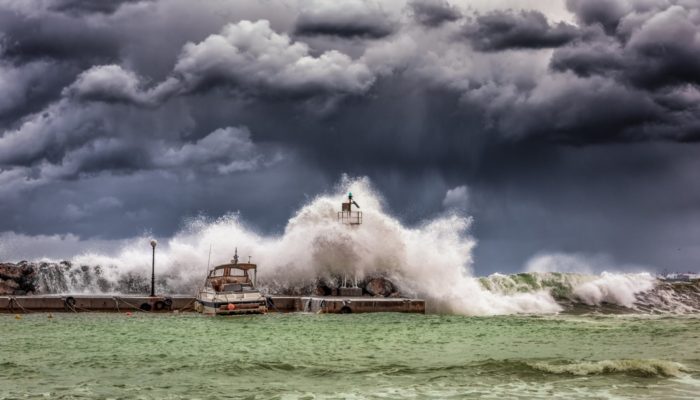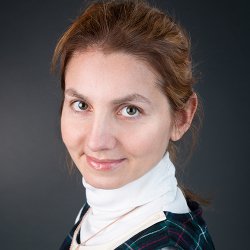
In this last post of 2019, I have the pleasure to ask some questions to Ira Didenkulova, the President of the EGU Natural Hazards division who has been recently elected for a second mandate.
Ira, can you introduce yourself and tell what led you the position of EGU Natural Hazard (NH) Division president? What are the main challenges you had and what’s next for the NH division?
It seems this is the most difficult question. OK. Let’s be short and formal. I am Ira Didenkulova. I am working as Senior Research Scientist in the Department of Marine Systems at Tallinn University of Technology and in Nizhny Novgorod State Technical University n.a. R.E. Alekseev. My research interests lie in the field of extreme sea waves, such as tsunami and freak waves.
As for NH division presidentship, it is a long story. Everything started in 2010 when I received the Plinius Medal by EGU. At that time it was a medal appointed to early-career scientists of the NH division with an emphasis on interdisciplinary research. I felt very honoured and had a strong internal push to give something back to EGU. This was the start. Following this push, in 2011 I volunteered to be a coordinator for the NH Outstanding Student Poster Award (now OSPP). The same year I became a Science Officer for the subdivision of Sea & Ocean Hazards in NH. I took these new initiatives with excitement and full dedication (as probably only ECS can do).
Then in 2015, Giorgio Boni (the previous NH president) nominated me as his deputy and later on, at the end of his term, asked me to run for the new elections. So, this is basically the story.
When I am thinking about it now, I find all of this very interesting from many perspectives.
It seems I joined the EGU Council at the best possible moment when EGU announced one of its priorities “Diversity and inclusiveness”. In a way, I am representing several different groups that are or have previously been under-represented within the EGU community. First, I have been also ECS until a few years ago. Second, I am female. And third, I am working in Eastern Europe. If gender diversity is nearly perfect in the EGU Council, country diversity is not. So, in the Council, I was identified as some kind of statistical outlier (1 out of 133 members) coming from Eastern Europe.
So, now I take it as a challenge for my Presidential term to promote diversity in all aspects. I also strongly encourage ECSs to get involved in EGU activities. I hope, I can serve as a good Role Model.
Communication is becoming more important for researcher and you are trying to improve visibility of the NH division by involving more people on communication and dissemination activities: why is so important to communicate not only to the scientific community but also to the entire society?
This is basic. We live on the Earth and everything we do in Geosciences has a direct impact on people and society in general. I think they deserve to and they should know what is going on. And when we talk about hazards, the level of importance amplifies tremendously as we talk about human lives. I believe Education in general, and Education in Geosciences in particular, is one of the biggest challenges we should all undertake. After all, it is our planet and this is the way we can influence its future.
This is also a reason, why we put such a big effort on our Social Media. If you noticed, we are now working hard on our NH social media accounts, sharing interesting news and communicating all our events. If you have not subscribed to it yet, please do! This is also the way to get involved!
Follow our Twitter account or our Facebook page!
You are always encouraging people to be active: why should researchers be active members of EGU and what can they do?
EGU is the leading organization for Earth, planetary and space science research in Europe with about 20000 members. If one is active and wants to change something in this World, EGU is a great place to do it.
How to get involved? Last year we introduced rotation for our Science Officers. Now the term for NH Science Officers is the same as for Presidents: a two-year-period with a possible extension for another two-year-period. The maximum duration of a term is thus four years, from General Assembly to General Assembly. With this rotation, it is very easy to step in and get involved. For example, we have an ongoing open call for 3 positions:
- NH6 Remote Sensing & hazards
- NH7 Wildfire Hazards
- NH11 Short Courses in Natural Hazards
So, if you are active in your research and willing to provide a service for EGU, I strongly encourage you to apply! See below for more detailed information.
I take the opportunity to wish all the readers a happy 2020 and for all researchers, I remind that the deadline for the abstracts’ submission for the coming EGU GA is approaching. The Natural hazards Early career scientist Team (NhET) has proposed several sessions, but many more sessions are available for submission of your abstract. Look the call for abstracts and submit your abstract before 15 January 2020, 13:00 CET.
CALL FOR SCIENCE OFFICER OF THE NH DIVISION
The term is fixed for a two-year-period with a possible extension for another two-year-period. The maximum duration of a term is thus four years, from General Assembly to General Assembly.
Anticipating your questions, at the end of this article you can find the main responsibilities of Science Officers. This should give you an overview of our activities.
Candidates should send a short motivation letter (incl. a short vision of the sub-division: how you see it, which part would you like to strengthen, which topics to add, etc.) and 1 page CV to egu.nhpres@gmail.com.
The deadline for applications is 10 January 2020.
The selection process will be based on the evaluation of the experience carried out in the topic related to selected sub-division, activity in international scientific associations, in addition to gender and country balance.
Please, spread this information among your colleagues and send applications to egu.nhpres@gmail.com (or didenkulova@mail.ru, or paolo.tarolli@unipd.it)
DUTIES AND RESPONSIBILITIES OF SCIENCE OFFICERS
The main role of Science Officers is to contribute to shaping and managing the EGU NH program in the area of their responsibility. This implies several major tasks all over the year.
- From June till September everybody is asked to propose new sessions. The role of Science Officers at this stage is to control that their sub-divisions are well represented. Representation is evaluated by the number of sessions which are led by NH. At this stage, you can contact conveners of the successful sessions of previous years and discuss with them whether they would like to run their sessions again. You are also encouraged to solicit new sessions with new topics.
- In September-October, we finalize the session program for the next GA. At this stage, Science Officers are asked to evaluate the sessions of their sub-divisions and to discuss with conveners possible merging of the sessions if several very similar topics are proposed.
- Until January we accept abstracts. The Role of Science Officer is to advertize EGU, its sub-division and its sessions.
- From January and later on we work with all the sessions and abstracts we receive. If you have been involved as a convener, you should know several steps (SOI, SOII and SOIII) to finalize the program. What Science Officers do is not very different from that. If some conveners missed the deadline, Science Officer communicates to them first, and if there is no more time to wait, takes the responsibility and finalizes all these stages for them. This includes ranking travel awards, accepting abstracts, deciding about the status of the session, etc. Apart from this Science Officers communicate to the conveners regarding all possible arising questions and also coordinate session merging.
Other activities Science Officers are involved in:
- organizing other conferences under the EGU umbrella,
- supporting our social media with information,
- reviewing the keywords for EGU,
- discuss and give timely feedback to EGU policies (there is always something coming from EGU Council to discuss),
- distribute new EGU information among conveners, authors or within your community,
- advertise our Awards and Medals in your communities,
- advertise our Journal NHESS,
- advertise other EGU events and activities,
- act in any way for NH division improvement.
